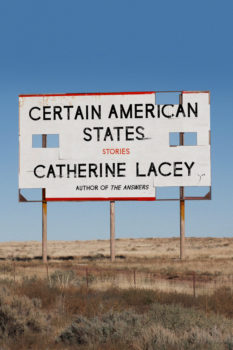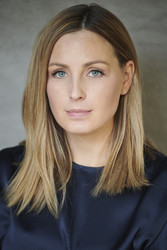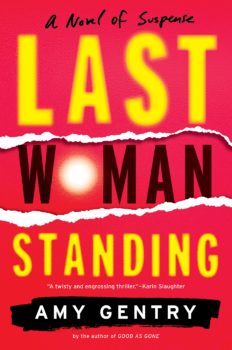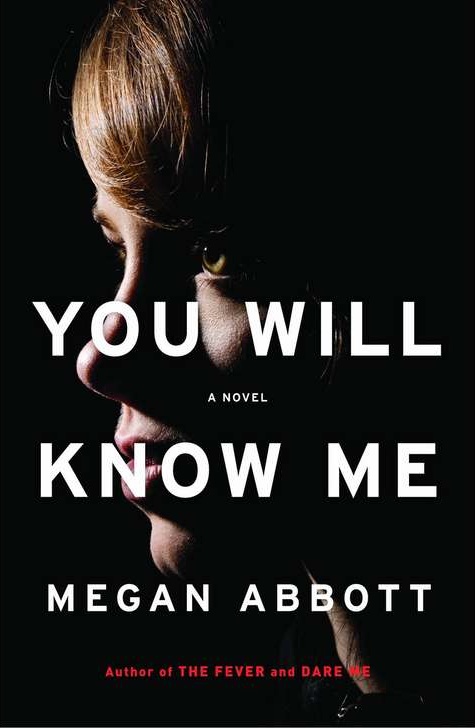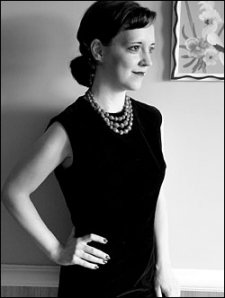 Megan Abbott is the Edgar-winning author of the novels Queenpin, The Song Is You, Die a Little, Bury Me Deep, and The End of Everything. Her latest offering, Dare Me, is a crime novel set in the world of competitive high school cheerleading. It has been short-listed for the Steel Dagger Award for the Crime Writers’ Association and optioned for a feature film by Fox 2000.
Megan Abbott is the Edgar-winning author of the novels Queenpin, The Song Is You, Die a Little, Bury Me Deep, and The End of Everything. Her latest offering, Dare Me, is a crime novel set in the world of competitive high school cheerleading. It has been short-listed for the Steel Dagger Award for the Crime Writers’ Association and optioned for a feature film by Fox 2000.
Abbott’s writing has also appeared in The New York Times, Salon, Los Angeles Times Magazine, The Believer, Los Angeles Review of Books, Detroit Noir, Best Crime and Mystery Stories of the Year, Storyglossia, Queens Noir and The Speed Chronicles.
Born in the Detroit area, she graduated from the University of Michigan and received her Ph.D. in English and American literature from New York University. She has taught at NYU, The State University of New York and The New School. Beginning in August 2013, she will be the Grisham Writer-in-Residence at the University of Mississippi.
Abbott came to Oxford to read from Dare Me in late August. She’s been one of my writing heroes for the better part of a decade now, and I had the good luck to sit down with her over Red Stripes at City Grocery an hour before the reading.
Interview
William Boyle: You cited Twin Peaks as a big influence on The End of Everything and you mentioned Laura Palmer in your article about competitive cheerleading for The New York Times a few weeks ago. I feel David Lynch’s presence in Dare Me, as well. There’s a Laura/Donna dynamic between Beth and Addy and a very palpable erotic tension throughout. Did Lynch influence Dare Me?
Megan Abbott: With me, it’s never one-to-one or conscious exactly. But this is interesting: when I had the title for The End of Everything I watched Mulholland Drive again and it’s a line in that film: “This is the end of everything.” Someone told me, “Oh, it’s also a line in your first book” [Die A Little], which I had written the year Mulholland Drive came out, so clearly that line is/was tattooed in my brain. So I think it mostly comes out in unconscious ways.
But that’s a great analogy. The Laura Palmer/Donna relationship is such a fundamental female friendship dynamic and that’s a perfect example with Beth and Addy. There’s always the one friend who takes all the air out of the room or is such a presence and the other one who is secondary and is longing to be that bigger person. There are those moments when Maddy comes and looks like Laura and then Donna realizes that she’s going to be dethroned again. There’s something about that complicated female dynamic that I think has been a pulse through a lot of my stuff.
And then sometimes I look at Lynch when I’m trying to add odd tensions to a scene. I get that a lot from him. It’s never direct either. But I’ll just sort of watch a bunch of his stuff to remind myself of why things are scary that wouldn’t necessarily seem scary. There’s a scene in Dare Me where Beth is talking about a dream she had and that definitely feels like a Lynch kind of thing. You know, when someone’s telling you the dream, but they’re telling it in a way that it becomes terrifying to the listener.
Also, in Lynch’s films everything is infused with eroticism. That’s something that’s probably characteristic of maybe all my books, but certainly the last two where it’s adolescence, so it takes over everything anyway.
Early in the book you confront the fetishization of cheerleaders head-on: “All those misty images of cheerleaders frolicking in locker rooms, pom-poms sprawling over bare bud breasts. All those endless fantasies and dirty-boy dreams, they’re all true in a way.” This put me in mind of Brian DePalma. It’s almost as if you’re playing a kind of trick he’d play, making us believe that’s true but yet undermining it with the portrait of the Cheerleader Real that you wind up painting. Was that your intention?
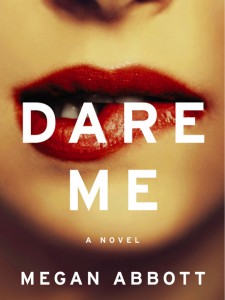
Can you speak a bit about the making of Beth? She’s so compelling. Did she start somewhere/with someone?
Beth was one of my most surprising creations because when I started her I really intended her to be the villain. I mean, I don’t write straight villains, but I intended her to be much more the antagonist mean girl, and I actually intended something bad to happen to her in the middle of the book. I changed the plot entirely because I grew to love her and she kind of shifted on me and became the hero of the book. So I started to give us more reasons to have sympathy for her once I started to like her. And I gave her more power and there were certain things I just didn’t want to do to her.
She’s based on a lot of the female friends I’ve had who have thick guards but the people that they’re loyal to they’re very loyal to. The other influence there would be Deadwood. I loved the idea on Deadwood that you would have the sheriff and you would have Al Swearengen, who’s the “bad guy,” and in the first episode you think it’s very clear and then slowly they start to switch places as the series goes on. In Dare Me, that doesn’t quite happen but I love the idea that the most dangerous people are the ones who think they know what’s right. That’s always been compelling to me.
I love the flashback to Beth at twelve, seeing the girl with the searing baton, saying “Look at that, look at that,” her voice still full of wonder. What role does wonder—or, to borrow a phrase from Tom Waits, the “deficit of wonder”—play here?
Now that you say it, I think that’s one of my abiding preoccupations. It certainly was a big factor in The End of Everything, that kind of wonder that you lose, your illusions about adulthood. And I think that’s true in this book, too. To me it’s the great loss, the great mourning that I always feel, and that I hope gets renewed. The idea that wonder could go away when you’re thirteen or fourteen or fifteen seems so tragic to me and seems like the greatest loss. In our irony-laden culture I so love to surround myself with people or works of art or books or movies that still find things to get really excited about or overwhelmed by and to have moments of transport. And, to me, that that would go away for Beth—I meant that to be sort of the saddest thing in the world. And, you know, of course Addy still has it, at least for most of the book. And I think that’s one of the most defining features of growing up: When you lose it do you lose it forever and what has to happen to make you lose it forever?
Why does this novel take place in an unnamed town and why is the rest of the school so invisible to the girls?
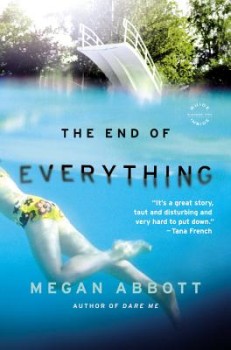 My books are always a little insular—that’s sort of the noir tradition—but I wanted this to be hyper-insular almost, like when you read a war novel or anything that’s all-consuming. I thought if I would get really specific about place that would give the reader a break and we’d move out of the realm. I remember the notes I got from my agent when he read the first draft. He insisted that we need to see a little more that there are other people in this school, just so we can realize how tight the focus is. And so he had me add a little bit there and my editor had me add a little bit of the parents, so that you would see how tight the focus is. Because to these girls there are no other people in the school and I wanted it to really feel that way.
My books are always a little insular—that’s sort of the noir tradition—but I wanted this to be hyper-insular almost, like when you read a war novel or anything that’s all-consuming. I thought if I would get really specific about place that would give the reader a break and we’d move out of the realm. I remember the notes I got from my agent when he read the first draft. He insisted that we need to see a little more that there are other people in this school, just so we can realize how tight the focus is. And so he had me add a little bit there and my editor had me add a little bit of the parents, so that you would see how tight the focus is. Because to these girls there are no other people in the school and I wanted it to really feel that way.
In my first two drafts I had no reference at all that Addy even had parents, and my editor said that that’s too conspicuous. Also, my last book [The End of Everything] had been so much about the family that part of it was I wanted to look totally at peer culture. Because I think everyone remembers how, at that age, your parents don’t necessarily exist . . . especially the later years in high school. But I wanted it to be even more so because in many ways the reason people join cheerleading or any sport—or the same reason people join a gang—is to make a family that they choose or a family when they don’t have one. And so that becomes everything for them.
There are so many great cheerleading details in the book. In the Times piece you mentioned trawling Facebook walls and message boards. Can you speak a bit more about your research? How did you achieve authority here?
I’m a compulsive researcher to a point and then I stop. But with the cheerleading—it did become sort of all-consuming, I have to admit. Because I felt like I had access in a way I normally couldn’t to these girls talking to each other on Facebook and on Fierce Board, which is a message board cheerleaders use frequently. They weren’t talking about their after-hours life and I didn’t need that, but they really talked very openly about their passion for stunts, their love of the risk, their celebration of injury, wonderful stuff I couldn’t get anywhere else. For instance—and I think this was too late to put in the book, which shows how long after I was looking at this stuff—I kept hearing them referring to “throwing fetus.” I thought, What are they talking about? What is this? Finally, the message board administrator made them stop using the term. It refers to fourteen-year-olds who are coming into the school—they’re like seventy-five pounds—so they can be top girl really easily because they’re so tiny. And the older cheerleaders resent it because they’re juniors or seniors and they’ve really trained to do this stuff but they’re women now. So they’d call them fetuses. How would I have gotten that otherwise? I could’ve talked to a hundred cheerleaders and none of them would’ve told me that, you can bet. It just felt like I had some sort of authority. And then, at a certain point, I just made stuff up. And that’s when you take the leap. But they wouldn’t really say that. I never saw any cheerleader talk the way Beth talks. I borrowed more from Richard III and Al Swearengen to get that. I actually had to scale it back a little bit because she was talking so big, but at a certain point it’s a novel.
Dare Me and The End of Everything seem like exemplary models of how to pace a book. Who are your influences in terms of pacing?
That’s the thing that comes least naturally to me and I work the hardest at. I really listen to my editor. I always have this problem with the copyedited version where I think things become tedious and I start to cut and I have to stop myself because I know the story and I’m impatient to tell it. I think my ideal model for pacing would be James Cain. His books are much shorter than mine, but there’s no scene that doesn’t work towards the tipping point of the desire or whatever the drive is. And my books aren’t that—I do have scenes that don’t work towards that. But it’s always been this model that the book should feel like the whisper in the ear like Cain’s do. And when you’re whispering something in someone’s ear there’s not a lot of room for a pause. Frequently, my editor will make me build in a pause. So that’s one of the things I’ll have to adjust—I’ll have to put in a pause scene, slow things down a little bit. But my tendency is to have a real kind of constant escalation and for escalation to work it has to be like a staircase. That’s something I’ve gotten better at but still have to work at. It’s kind of like the carving part in a book. Some people it comes naturally to—to me, it doesn’t. There are a lot of authors I love that probably don’t pace like that. But Cain does and you really feel like you’re running towards the edge of a cliff in his books, and I always want it to be like that.

